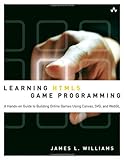James Williams
Co-creator of Griffon and Author of Learning HTML5 Game Programming
James Williams is a Senior Software Engineer for Taulia based in Silicon Valley and a frequent conference speaker. He is a co-creator of the Griffon project, a rich desktop framework for Java applications. He and his team WalkIN, created a product on a coach bus while riding to SXSW, and were crowned winners of StartupBus 2011. He is the author of the upcoming book "Learning HTML5 Game Programming..." for Addison-Wesley. He blogs at http://jameswilliams.be/blog and tweets as @ecspike.
Blog
Running Ratpack inside Grails
Posted 2012-01-24 12:30:00.0
When I would present on Ratpack at conferences, one of the main questions I'd get would be around the migration path from Ratpack to Grails. I'd usually answer noting that you could run Ratpack along side Grails. It turns out it is incredibly simple to more »Say No to iBooks Author
Posted 2012-01-23 02:00:00.0
Apple, at their recent event announcement, unveiled a new innovation in the textbook market with iBooks Author. Most of the words around this event use flowery language of how groundbreaking it is and how it will change the market. I think it stands to more »HTML5 Game Programming FAQ Day 2
Posted 2012-01-13 02:00:00.0
This week I'm answering questions about HTML5 and Game Programming in general over at CodeRanch. Wednesday's questions seems to be dominated by inquiries of cross-browser feature compatibility with several variants. *Q: What are some device conmore »Presentations
Ratpack - Lightweight Framework for Groovy
TBDmore »Ratpack: Classy and Compact Groovy Web Apps
Ratpack is a micro web framework for Groovy inspired by the Sinatra web framework for Ruby. Running Jetty and Groovy's template engine at its core, Ratpack is very capable and extensible while also enabling you to write single file web apps. It fits the smore »Books
by James L. Williams
-
Get Started Fast with HTML5 Online Game Programming!
HTML5 will transform web and mobile gaming. As new browsers rapidly adopt it, HTML5 will do everything “legacy” technologies such as Flash and Silverlight have done—and much more. In Learning HTML5 Game Programming, pioneering developer James L. Williams gives you all the knowledge, code, and insights you’ll need to get started fast!
Williams combines detailed explanations of HTML5’s key innovations with examples, including two case study applications that address the entire development process. He guides you through setting up a state-of-the-art HTML5 development environment; making the most of HTML5’s canvas tag, SVG vector graphics, and WebGL 3D; and targeting diverse mobile and social platforms. It’s all here: from the essentials of online game design to the nitty-gritty details of performance optimization.
About the Website
All code samples and answers to chapter exercises are available for download at www.informit.com/title/9780321767363 and on Github at https://github.com/jwill/html5-game-book.
Coverage includes
· Understanding the HTML5 innovations that make it possible to create amazingly rich games
· Setting up a state-of-the-art open source HTML5 game development environment
· Using JavaScript to drive sophisticated interactions between users and games
· Building basic games fast, with the prototype-based Simple Game Framework (SGF)
· Generating movement and gameplay with the canvas tag and surface
· Creating games with SVG vector graphics using the RaphaëlJS Javascript library
· Using Three.js to build powerful WebGL 3D games with far less complexity
· Developing games without JavaScript, using Google Web Toolkit (GWT) or CoffeeScript
· Building a complete multiplayer game server using Node.js and WebSockets
· Planning and choosing tools for mobile game development with HTML5
· Optimizing game performance with offline cache, minification, and other techniques
Learning HTML5 Game Programming is the fastest route to success with HTML5 game development—whether you’re a long-time game developer or a web/mobile programmer building games for the first time.
-
Get Started Fast with HTML5 Online Game Programming!
HTML5 will transform web and mobile gaming. As new browsers rapidly adopt it, HTML5 will do everything “legacy” technologies such as Flash and Silverlight have done—and much more. In Learning HTML5 Game Programming, pioneering developer James L. Williams gives you all the knowledge, code, and insights you’ll need to get started fast!
Williams combines detailed explanations of HTML5’s key innovations with examples, including two case study applications that address the entire development process. He guides you through setting up a state-of-the-art HTML5 development environment; making the most of HTML5’s canvas tag, SVG vector graphics, and WebGL 3D; and targeting diverse mobile and social platforms. It’s all here: from the essentials of online game design to the nitty-gritty details of performance optimization.
About the Website
All code samples and answers to chapter exercises are available for download at www.informit.com/title/9780321767363 and on Github at https://github.com/jwill/html5-game-book.
Coverage includes
· Understanding the HTML5 innovations that make it possible to create amazingly rich games
· Setting up a state-of-the-art open source HTML5 game development environment
· Using JavaScript to drive sophisticated interactions between users and games
· Building basic games fast, with the prototype-based Simple Game Framework (SGF)
· Generating movement and gameplay with the canvas tag and surface
· Creating games with SVG vector graphics using the RaphaëlJS Javascript library
· Using Three.js to build powerful WebGL 3D games with far less complexity
· Developing games without JavaScript, using Google Web Toolkit (GWT) or CoffeeScript
· Building a complete multiplayer game server using Node.js and WebSockets
· Planning and choosing tools for mobile game development with HTML5
· Optimizing game performance with offline cache, minification, and other techniques
Learning HTML5 Game Programming is the fastest route to success with HTML5 game development—whether you’re a long-time game developer or a web/mobile programmer building games for the first time.

